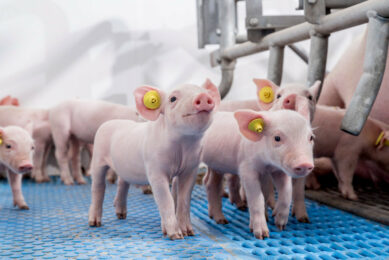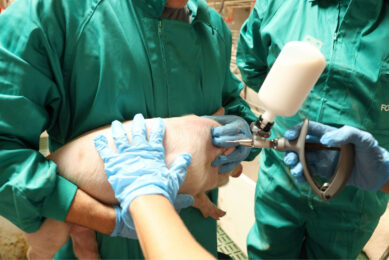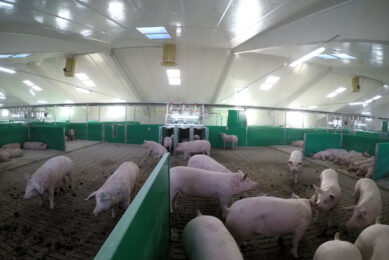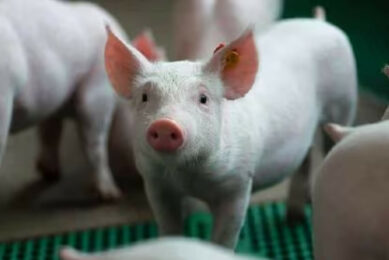Proudly passing knowledge on to the next generation

On Dr Alberto Stephano’s calendar, the dates 8, 9, 10 and 11 June are circled in red. On these days, he and his organising ?committee will host the 23rd International Pig Veterinary Society congress in Cancún, Mexico. What to expect?
By Vincent ter Beek
There were not that many pig veterinary congresses back in the early 1980s. The one that did exist, the International Pig Veterinary Society (IPVS) congress, came to Mexico City in 1982. It was awaited for a long time, and like many others, young Mexican pig veterinarian Alberto Stephano grabbed the opportunity to attend.
Thirty-two years later, Stephano can still recall that congress’ strong scientific character. “I remember one speaker in particular, unfortunately I cannot remember his name, saying after he had spoken for 15 minutes: ‘This was the summary of my results of research of the last 15 years.’ He really expressed what was research those days. Delegates were mainly researchers and fewer practitioners.”
Thirty-two years after this event in Mexico City, the world of pig production has grown a lot, both in scale and complexity.
The IPVS congress developed in a similar fashion and grew to be an anchor for vets and practitioners alike, every other year. The year 2014 marks the return of the congress to Mexico, to the seaside resort Cancún.
IPVS
The scientist and veterinary consultant Dr Alberto Stephano hardly missed an edition of the IPVS congresses after 1982 – and now it is up to him to be in charge as president. He has known his task since Mexico was elected to be 2014’s destination at the closing ceremony of 2010’s congress in Vancouver, Canada.
Speaking to Pig Progress he says, “In fact, we have been busy with it a lot longer than 2010. We started with a first bid at the IPVS congress in South Africa in 2008. At that time we did not get through to the second round; we lost against South Korea. We went to Vancouver with a bid again in 2010 – but that time much better prepared, better organised.”
What followed were years with growing pressure to deliver a congress that would meet the expectations. Where Vancouver (2010) attracted about 2,700 pig veterinarians and Jeju two years later attracted over 3,000 participants of which 2,232 veterinary delegates, the event in Mexico is targeted to attract about 2,500 participants. A lot of attention will come from countries in the direct vicinity of Mexico, as well as Spanish speaking communities.
After long days with many hours of preparation, Stephano can reveal that ‘international’ and ‘science’ will be key features for the 2014 edition. He explains, “The majority of the 1,000 plus paper submissions are from Mexico (165), then the United States (156) and also Spain (78). They come from 49 countries all over the world. The screening committee is different than in previous years as we have gathered 51 independent scientists from all over the world – not only from Mexico. This way we hoped to encourage researchers from all over the world to send in papers and participate. They will go through each paper and decide which will be presented. We hope in the end to be able to present about 220-240 oral papers.”
Third option
He continues, “In addition, we will address more areas than only the classical health issues. We felt we also have to address topics like nutrition, reproduction, welfare, etcetera – all can have serious effects on health. Each of these – 15 in total – will be introduced by a lead speaker. This is complemented by the Tom Alexander Memorial Lecture, which is being done this time by Dr John Harding from Canada.”
Another novelty will be that for the first time, there will be a third option between oral and poster papers – as there will be ‘corner’ papers. Almost like a pitch option, scientists can briefly, with six to eight people at the same time, highlight their research in about five minutes, after which there is a short opportunity for discussion. This way, authors are thought to make more effort to be present at the congress in person. Conventional oral presentations, will be extended to last 20 minutes – 15 minutes of speaking and five minutes time for discussion.
Topics
PRRS is likely to take main stage, together with a newcomer, being Porcine Epidemic Diarrhoea virus (PEDv). This disease, predominanly causing mortality in the preweaning phase, has been frightening the North American continent for about a year now, including Mexico.
Provinces like Jalisco and Michoacán were affected after which the disease also affected farms in Northern Mexico.
Whether or not interested congress delegates will have the opportunity to visit a pig farm in June is still a matter of debate.
It has been a cause of worry for Stephano, saying, “We hoped to offer the veterinarians to come and have a look at a very large, beautiful and vertically integrated facility in the jungle. I’m afraid, however, we may have to cancel it for biosecurity reasons.”
PEDv or not, the return of IPVS to Mexico means orgullo, pride, Stephano explains. Just like in 1982, the Cancún edition will be one big invitation for young future vets to focus on pig production. He says, “We aim to get many young scientists to come to Cancún and get them involved. The congress will provide them with the opportunity to meet first hand with top class scientists from all over the world. We hope they will all be very inspired.”
BIOGRAPHY
Dr Alberto Stephano, IPVS president, has been in the veterinary industry since the early 1970s, obtaining his DVM from the National University of Mexico (UNAM), and an MSc from the Royal Veterinary College in London, UK. He then became the head of the Regional and National Diagnostic Laboratory at the Mexican Ministry of Agriculture and Livestock. Dr Stephano was a professor and researcher for 22 years at the UNAM with his main field being Pathology, which over the years evolved into swine diseases and production; he also was the head of the university’s Swine Production Department for seven years. In recent years he has worked as an international swine consultant. He published more than 200 scientific articles and was a speaker at over 300 conferences around the world.
[Source: Pig Progress magazine Vol 30 nr 4, 2014]











